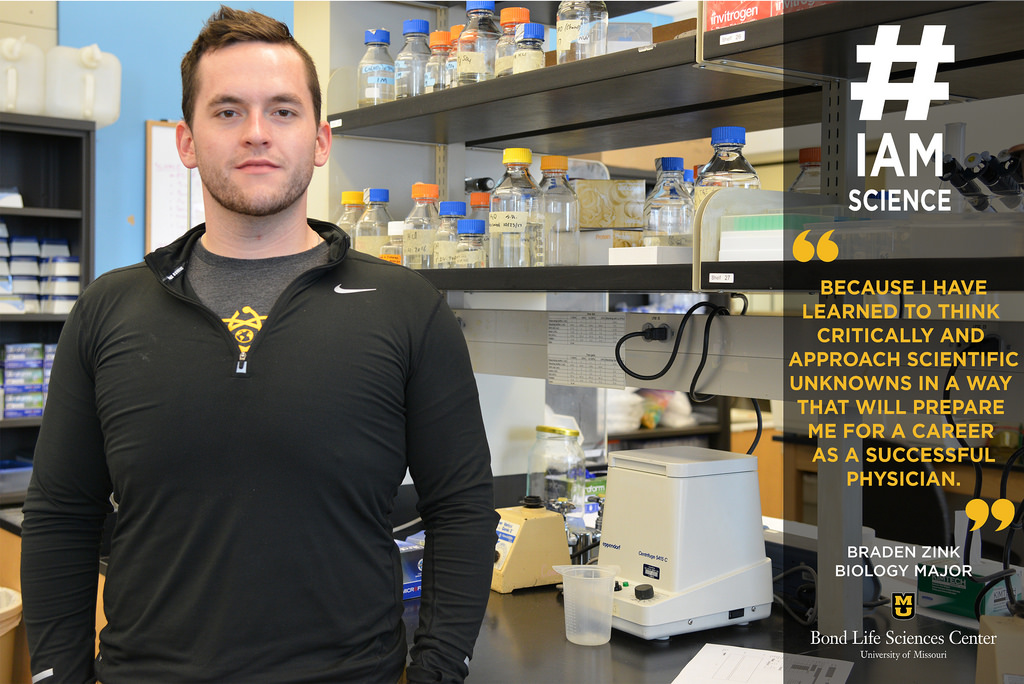Published on

Braden Zink, a biology major at MU, stands near his lab station in the Angelovici Lab in Bond LSC. | photo by Allison Scott, Bond LSC
By Allison Scott | Bond Life Sciences Center
“#IAmScience because I have learned to think critically and approach scientific unknowns in a way that will prepare me for a career as a successful physician.”
Labs aren’t born in a day. Neither are researchers.
Braden Zink, a senior biology major, could tell story after story about just that. He came to Mizzou with little knowledge of university research but with the determination to get his feet wet. As a member of Ruthie Angelovici’s lab, he did both.
“I came to college completely unaware of how research worked and the kinds of problems that research scientists work to solve,” Zink said. “I joined Dr. Angelovici’s lab during her first year as an MU professor and was thrilled to have the opportunity to help get it off the ground.”
With the lab’s goal of improving sustainability and nutritional quality of seeds, Zink has been able to make great strides in plant sciences. His current project is focused on how the size of seeds relate to their metabolic profiles.
“I had to come up with a way to measure Arabidopsis seeds because they’re the size of salt grains,” Zink said. “I came up with a protocol and performed size analysis on hundreds of ecotypes. My ultimate goal is to identify a gene or several that explain the observed variation in seed size.”
Last summer, Zink took advantage of working as a full-time researcher at Bond LSC.
“My work this past summer led to the conclusion that there’s a significant negative correlation between seed size and the quantity of several amino acids,” Zink said. “In general, I discovered that bigger seeds have proportionally less amino acids.”
This information led him to a working hypothesis that metabolic adjustments other than amino acids must be responsible for seed size variation.
Zink was able to work all summer solely on his research in Bond LSC thanks to the Cherng Summer Scholars grant funded by the founders of Panda Express, who happen to be Mizzou alumni. As one of 12 recipients — making it the most competitive grant for undergraduates — Zink’s dedication to his craft was recognized in a big way.
“I was able to focus intensely on my research and was immersed in it. Over the summer I didn’t have obligations to course work, so I was really able to be all in,” Zink said. “I believe what I’ve accomplished in research will help to set me apart from other candidates as I apply to medical school this year.”
He took his findings from the summer and presented as part of the Missouri EPSCoR program, which is run by the National Science Foundation (NSF) to provide more financial resources to scientifically underfunded states.
“I presented the poster as one of around 80 Missouri scholars,” Zink said. “Included in the presenters were students at all levels below professor, so it really highlighted what up-and-coming scientists are doing.”
After the event in late August, Zink was one of 10 presenters chosen to move forward and share their work in front of a national committee of NSF scientists. As the only undergraduate student selected from the state, it was an exciting opportunity.
“It was a closed room presentation with scientists whose work I’ve been reading for a while asking me questions about my science, so it was nerve-wracking,” Zink said. “While intimidating, this was also an incredible opportunity for my work to undergo an acid-test. Having my project hold water while being evaluated by nationally recognized scientists was an experience that confirmed that the work I’m doing is both professional and meaningful.”
While his accomplishments as an undergraduate researcher speak for themselves, Zink’s next step is medical school.
“Ideally, I want to become a cardiologist,” Zink said. “I’ve shadowed Dr. Greg Flaker — a seasoned cardiologist and head of cardiac research at the University of Missouri Hospital — and the work is something I could see myself doing in my professional career. I see this as an opportunity to offer critically ill patients 10 or 15 more years of life. It is a force that drives me towards joining this field.”
Zink plans to incorporate the lessons he’s learned at Bond LSC on his path to becoming a cardiologist.
“I’ll be doing a lot of the same style of critical thinking I do now,” Zink said. “Research has helped me do things that most undergraduates don’t get to. It helps you get ahead of the ball.”
Although there are more discoveries to be made, Zink is happy to contribute what he can to get things moving in the right direction.
“I understand that the contributions I’ve made — and continue to make — will only be a drop in a massive bucket,” Zink said. “However, each drop in this bucket is necessary if it is ever to be filled.”